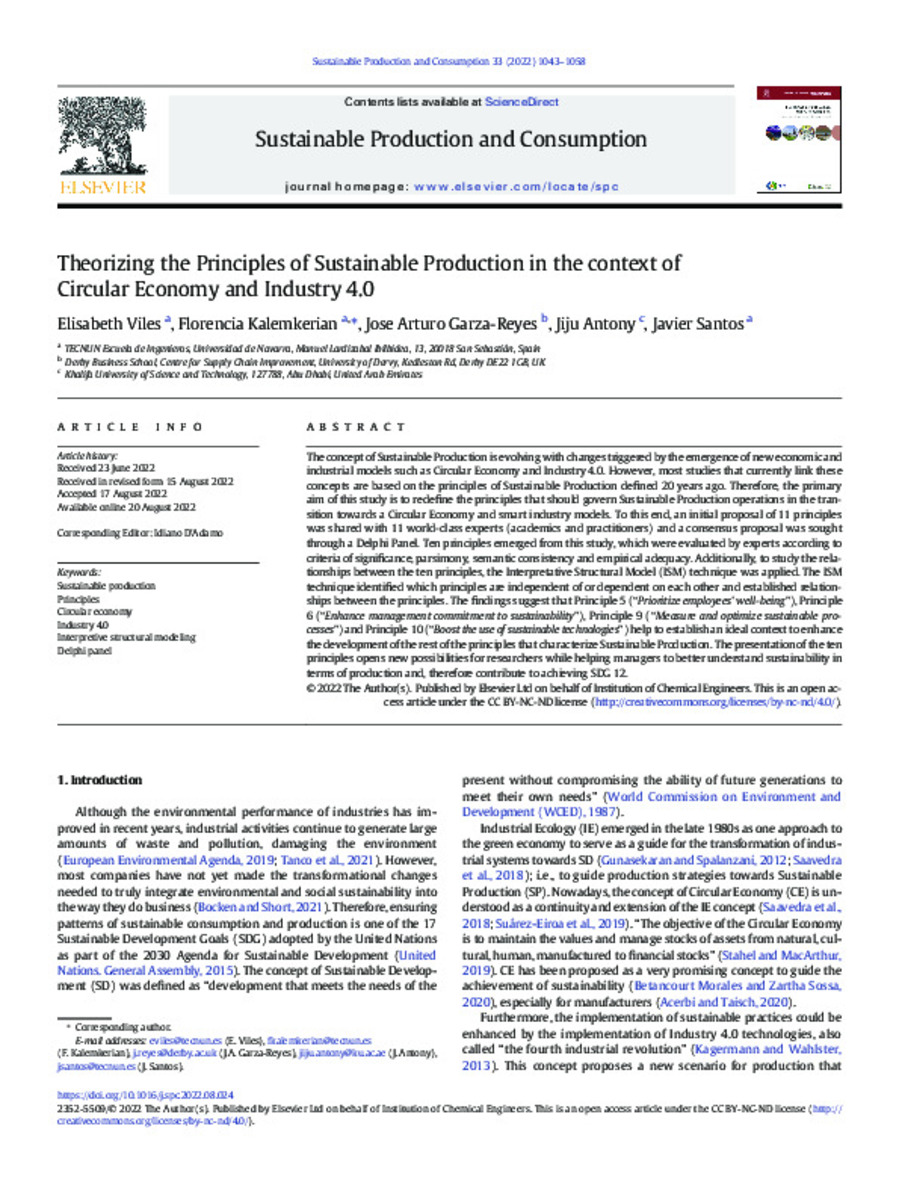Full metadata record
| DC Field | Value | Language |
|---|---|---|
| dc.creator | Viles-Díez, E. (Elisabeth) | - |
| dc.creator | Kalemkerian, F. (Florencia) | - |
| dc.creator | Garza-Reyes, A. (Arturo) | - |
| dc.creator | Antony, J. (Jiju) | - |
| dc.creator | Santos, J. (Javier) | - |
| dc.date.accessioned | 2023-03-28T08:55:19Z | - |
| dc.date.available | 2023-03-28T08:55:19Z | - |
| dc.date.issued | 2022 | - |
| dc.identifier.citation | Viles-Díez, E. (Elisabeth); Kalemkerian, F. (Florencia); Garza-Reyes, A. (Arturo); et al. "Theorizing the principles of sustainable production in the context of circular economy and industry 4.0". Sustainable Production and Consumption. 33, 2022, 1043 - 1058 | es |
| dc.identifier.issn | 2352-5509 | - |
| dc.identifier.uri | https://hdl.handle.net/10171/65804 | - |
| dc.description.abstract | The concept of Sustainable Production is evolving with changes triggered by the emergence of new economic and industrial models such as Circular Economy and Industry 4.0. However, most studies that currently link these concepts are based on the principles of Sustainable Production defined 20 years ago. Therefore, the primary aim of this study is to redefine the principles that should govern Sustainable Production operations in the tran- sition towards a Circular Economy and smart industry models. To this end, an initial proposal of 11 principles was shared with 11 world-class experts (academics and practitioners) and a consensus proposal was sought through a Delphi Panel. Ten principles emerged from this study, which were evaluated by experts according to criteria of significance, parsimony, semantic consistency and empirical adequacy. Additionally, to study the rela- tionships between the ten principles, the Interpretative Structural Model (ISM) technique was applied. The ISM technique identified which principles are independent of or dependent on each other and established relation- ships between the principles. The findings suggest that Principle 5 (“Prioritize employees' well-being”), Principle 6 (“Enhance management commitment to sustainability”), Principle 9 (“Measure and optimize sustainable pro- cesses”) and Principle 10 (“Boost the use of sustainable technologies”) help to establish an ideal context to enhance the development of the rest of the principles that characterize Sustainable Production. The presentation of the ten principles opens new possibilities for researchers while helping managers to better understand sustainability in terms of production and, therefore contribute to achieving SDG 12. | es_ES |
| dc.language.iso | eng | es_ES |
| dc.publisher | Elsevier | es_ES |
| dc.rights | info:eu-repo/semantics/openAccess | es_ES |
| dc.subject | Sustainable production | es_ES |
| dc.subject | Principles | es_ES |
| dc.subject | Circular economy | es_ES |
| dc.subject | Industry 4.0 | es_ES |
| dc.subject | Interpretive structural modeling | es_ES |
| dc.subject | Delphi panel | es_ES |
| dc.title | Theorizing the principles of sustainable production in the context of circular economy and industry 4.0 | es_ES |
| dc.type | info:eu-repo/semantics/article | es_ES |
| dc.description.note | This is an open access article under the CC BY-NC-ND license | es_ES |
| dc.identifier.doi | 10.1016/j.spc.2022.08.024 | - |
| dadun.citation.endingPage | 1058 | es_ES |
| dadun.citation.publicationName | Sustainable Production and Consumption | es_ES |
| dadun.citation.startingPage | 1043 | es_ES |
| dadun.citation.volume | 33 | es_ES |
Files in This Item:
Statistics and impact
Items in Dadun are protected by copyright, with all rights reserved, unless otherwise indicated.






